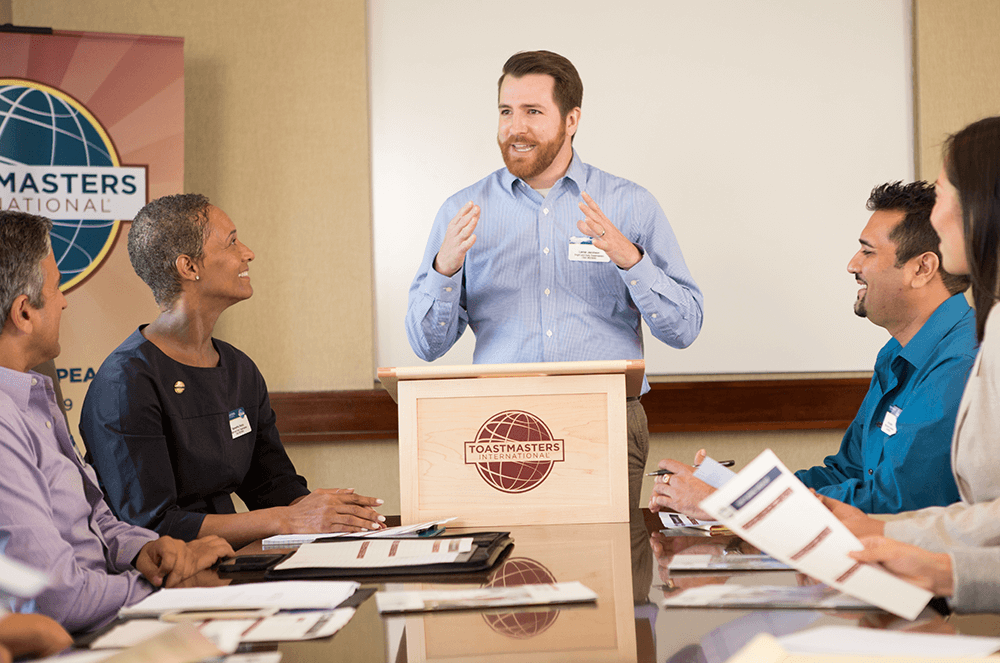
I am one happy Toastmaster when I attend a well-organized, engaging, and educational club meeting. I’ve been lucky enough to experience that many times over the years.
Yet I’ve also experienced some club meetings that are chaotic, inefficient, and flat. These always leave me a little frustrated and dissatisfied. Perhaps you have had similar experiences.
While it’s unfortunate that some meetings don’t live up to their potential, the good news is they all can. As Toastmasters, we can learn from each other and make every meeting a great one. The more we like being there, the more we’ll benefit. As Toastmasters International founder Dr. Ralph C. Smedley once said, “We learn best in moments of enjoyment.”
Building a Strong Foundation
Toastmasters doesn’t have a mandatory meeting format; however, meetings are built around three elements: prepared speeches, Table Topics®, and speech evaluations. In addition, it’s recommended that clubs hold a business session at the beginning or end of meetings at least once a month.
Otherwise, clubs have a lot of leeway with what they can do. Many have unique meeting roles (Jokemaster, Mystery Greeter, Meeting Poet). Some conduct educational sessions or host outside speakers. This flexibility allows each club to create its own unique personality.
Yet great clubs also have a few things in common. Let’s define “great” as a club where members want to stay and guests want to join. Members’ goals are met, and there is a strong sense of community and support.
Whatever your club’s personality or your members’ goals, these six elements can help your meetings be great.
1 Be well prepared for meeting roles.
Advance planning helps members be prepared and better able to succeed. Some clubs distribute their agenda about three weeks in advance, which gives each participant time to properly prepare for their role. If three weeks is not realistic for your club, try to at least get the agenda out early and not scramble at the last minute. That way if a member is unsure of what their role requires, they have time to get help from the Vice President Education (VPE) or their mentor if they have one.
2 Begin and end meetings on time, and follow an agenda.
Developing the skills to prepare and adhere to an agenda is an important part of every Toastmaster’s development. While the Toastmaster of the Day takes the lead in managing the meeting flow, everyone with a role helps. Brenda Toth, of Garden City Toastmasters of St. Catharines, in Ontario, Canada, says when she served as Sergeant at Arms, she always worked closely with the Toastmaster to help keep the meetings running on time. “It’s not all up to the Toastmaster,” says Toth.
To that end, some members with roles will need to make adjustments during the meeting. For example, if the meeting is running late, the Table Topicsmaster might need to shorten the number of questions. If you’re assigned a meeting role, review the agenda to know exactly how much time you have been allocated.
3 Welcome guests and make them feel part of the group.
Look at a meeting from the perspective of both guests and members. For guests, a supportive, positive environment is key. Immediately greet visitors when they arrive and introduce them to other members. The more they feel comfortable and included, the more likely they are to return.
At Viva Las Voices Club in Las Vegas, Nevada, every officer assumes responsibility for guests, ensuring they are not alone during a meeting. “Guests are extremely important to our club,” explains Club President Christine Wittwer. “We ensure they have a great experience and leave with a visitor information packet. And we contact each guest following their visit to invite them back.”
The same principles apply to an online meeting. Invite guests to log on early before things start and get to know other members. The Club President or Toastmaster should also formally acknowledge and welcome each guest at the start of the meeting, and ask for any comments or feedback at the end.
4 Give speakers proper introductions and positive, helpful evaluations.
A proper introduction sets a speaker up for success by providing background on them and explaining their speech’s goals or objectives.
This gives audience members more context for what they’re about to hear. An introduction is also a chance to help the speaker by relaying basic information about their topic that would otherwise take up valuable speaking time.
Effective speaker evaluations are a hallmark of every great meeting. As speakers, we improve when we receive positive and practical feedback. Just as a speaker needs to prepare, so do evaluators. Make sure you are familiar with the speaker’s speech assignment as well as the speaker’s objective. When giving feedback, offer constructive suggestions for improvement and deliver them with encouragement.
5 Recognize member achievements.
Celebrating the progress of members is crucial. When I was a member of Rose City Toastmasters, in Welland, Ontario, Canada, we would always acknowledge member achievements during meetings. The Club President or VPE would make a point of recognizing major speech milestones (Ice Breaker speech, Pathways path completion, speech contest participation, etc.). We also recognized (with their permission) members who experienced major life changes (new job or promotion, having a baby, etc.). A little recognition goes a long way.
6 Regularly update members on club business and progress.
Is the club business meeting the least popular aspect of Toastmasters? Some members think so. Yet when done right, they can actually be fun—yes, fun! Members who take pride in their club want to know how well it is doing. It’s a time to celebrate your success. The club officers can each provide updates on their respective areas of responsibility. The VPE or Club President can review the club’s status in the Distinguished Club Program. That’s a perfect opportunity to highlight member progress.
If there are areas of concern, the Club Executive Committee should review these issues and develop a plan to address them. In addition, it’s never too late to review your current meeting format and look for ways to improve the member and guest experience. In fact, try to do this on a regular basis.
Applying Your Skills
You can also apply the benefits you gain from successful meetings to your life outside the club. When you run a successful meeting, you gain skills that will help you stand out among your peers. You’ll develop more confidence, a deeper appreciation for efficient and punctual meetings, and better organizational skills. When you evaluate speakers, you hone your ability to offer helpful feedback to people in all kinds of settings.
A final word on Toastmasters meetings. The most important factor is attitude. You must want to create and run a successful club meeting. One that meets everyone’s needs. High-quality clubs are filled with energetic and enthusiastic members, and officers who put best practices to work. Members are prepared for meetings, happily welcome guests, and provide valuable and positive feedback to speakers.
As Kathy Orth, President of Garden City Toastmasters of St. Catharines, in Ontario, Canada, says, “These elements constitute the ‘scaffolding’ upon which we hold our meetings. They are habits now, and new members seem to take to them easily.”
Now, how will you create your own great meetings?
Greg Lewis, DTM is a retired business professional who strives to inspire and encourage his fellow Toastmasters. He and his family live in Fonthill, Ontario, Canada.
Related Articles

Club Experience
Stay in Love With Your Club

Club Experience
Break Away From the Everyday

Diversity and Inclusion



 Previous
Previous

 A Checklist for Club Meetings
A Checklist for Club Meetings
 Previous Article
Previous Article